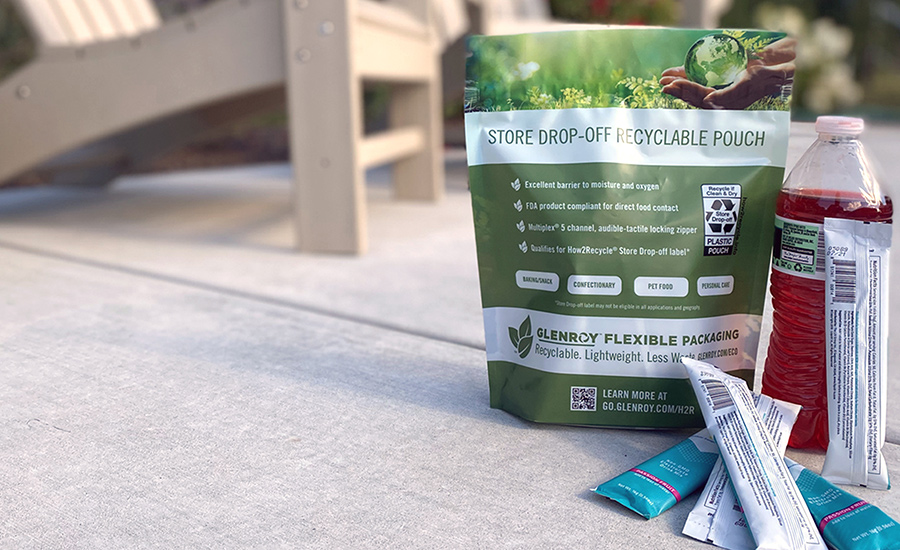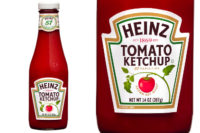While many brand owners and consumer packaged goods (CPG) companies are clamoring for more recycled plastic content, supply just isn’t there to meet demand in late 2021. Numerous chemical recycling companies, small and big, are moving quickly to create post-consumer recycling (PCR) supply, but commercial scale is in the early stages.
To counter this, many companies are focusing on immediate partnerships to meet recycling targets by adding programs and agreements to upcycle plastic film products.
One company making these moves is Milwaukee's Glenroy, Inc., with its TruRenu stand-up pouch. Glenroy recently announced at the 2021 Pack Expo Las Vegas show that the company’s TruRenu pouch had been submitted for a recycling assessment by Trex Co. and its NexTrex Recycling Program. Trex is a manufacturer of wood alternative decking and railing, and reclaims and repurposes more than 850 million pounds of polyethylene (PE) plastic waste and reclaimed wood scrap annually through a number of commercial partnerships and community programs.
Rail and decking construction companies are driving demand for the wood-plastic composite, with the construction segment commanding a 55.5% share in 2019, with a 8.57% compound annual growth until 2027, according to Fortune Business Insights.

Courtesy of Glenroy Inc.
Besides the upcycling program, Trex also introduced earlier this year the company’s package testing and labeling initiative that’s designed to help brands inform consumers about packaging recycling and upcycling into Trex decking.
To qualify for the certified NexTrex label, product packaging must be made of PE plastic and pass three stages of testing to ensure that it meets the criteria for use in the Trex manufacturing process:
- Package/film recyclability
- Risk/impact of product contamination
- Affect/risk of “look-alike” package contamination
Glenroy’s TruRenu stand-up pouch has effectively passed Stage 1 of the NexTrex testing process, meaning the virgin packaging material has been determined to be made of PE plastic and meets the company’s general recycling standards. Glenroy’s TruRenu portfolio includes press-to-close stand-up pouches, film laminations and premade STANDCAP inverted pouches that are made with up to 53% PCR content, such as milk jugs, juice jugs and water bottles.
Glenroy’s TruRenu’s pouch packaging was recently used for Walex Products Company and its bio-active septic tank treatment pods and eventually qualified for the How2Recycle store drop-off label program.
“Qualifying for the NexTrex program adds both perceived and tangible value to our flexible packaging that our brand partners can then pass on to consumers,” says Evan Arnold, VP of business development for Glenroy, Inc. “We are confident that this affiliation and certification will drive consumer participation in recycling.”
Circular Partnerships Heating Up
In an announcement in September, Dow Chemical and Bollore have joined forces on a pilot program that uses advanced recycling feedstock to create Bollore’s OXBTEC_RCB barrier shrink film that’s designed for food contact specifically for UK-based Yorkshire Packaging Systems. The food-grade packaging film will be used in packaging of whole bird products by Cranswick, a supplier of meat and poultry.
At the heart of this pilot program is the feedstock that’s made up of 100% plastic waste and produced by advanced or chemical recycling.
“Bollore is thrilled with the successful technological advances that made it possible for us to present a certified recyclable barrier film for modified atmosphere packaging (MAP),” says Nicolas Badier, product and R&D manager at Bollore. “This overcomes one of the biggest challenges of the industry and allows a film with recycled content to be used in food contact applications.”
Bollore and Dow Chemical’s partnership is just another example of how quickly Dow Chemical is moving in the advanced recycling and shrink-film segment. In early 2021, Dow Chemical announced a partnership with Lucro Plastecycle, an Indian recycling company, and Marico Limited, a Indian-based consumer goods company. Marico Ltd. is now using Dow's PCR-based shrink films in its line of consumer products.
Eastman Chemical Co., out of Kingsport, Tenn., also made a big move in early 2021 in the chemical recycling segment with its announcement of a $250 million investment to build a plastics sorting and methanolysis plant in Tennessee that will decompose polyester-based, multi-layer packaging back into component monomers.
On-The-Horizon Technology
The Council for Scientific and Industrial Research (CSIR) in South Africa announced in late August that the organization is developing a pilot program for a bioplastic technology to produce 100% biodegradable and compostable plastic from biopolymer feedstock.
This biobased processing technology from CSIR is based on the use of biopolymers and agricultural waste byproducts, such as starch, cellulose and glycerol, that will break down the plastic in landfills.
“Through the smart use of additives, we have created unique formulations to modify the properties through a melt-processing technique,” says CSIR senior researcher, Dr. Sudhakar Muniyasamy. “This has resulted in pellets that can be blown into films for carrier bags, kitchen waste bags, mulch films and packaging films, as well as rigid cutlery products.”
The preliminary biotechnology process from CSIR has been validated in an industrial manufacturing facility. “The pilot scale production of the pellet feedstock and industrial-scale conversion process is now ready for a specific product line,” adds Muniyasamy.
As part of the commercialization process, the CSIR is now working toward licensing the technology.



